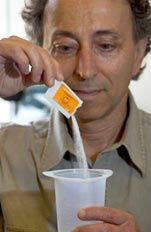Vitamin and mineral deficiencies cause widespread illness and early death in many developing nations. Anemia, for instance, usually caused by iron deficiency, is the world’s second-leading cause of disability, affecting just under half of preschool children and more than half of pregnant women in low-income countries.
In Canada, staple foods and children’s cereals are commercially fortified with iron and other essential vitamins and minerals. It’s an effective remedy – North American malnutrition prevalence is a fraction of that of developing nations. But it’s both expensive and unsuitable for areas where food comes straight from the field rather than through a factory.
Stanley Zlotkin, a professor of nutritional sciences and pediatrics, has spent more than a decade championing an innovative – and frugal – alternative: home fortification.
His product, called “Sprinkles,” is a sachet of powder containing enough micronutrients for one child for one day. The powder costs two to three cents per packet to produce, and when mixed in with a meal, helps prevent anemia, rickets, and other conditions brought on through malnutrition.
Affordability was just one of several factors Zlotkin considered when developing the product. “The other important components are convenience, no requirement for users to be literate, and ability to use traditional local infant food,” he says. “Sprinkles can be added to any semi-solid food, without changing the taste, texture, colour or smell.”
To arrive at this seemingly simple solution, Zlotkin spent years researching, experimenting and then promoting his product. His work has involved everything from learning how to encase nutrients in soy to keep them from affecting the food to finding partners who could produce and distribute Sprinkles all over the world.
Zlotkin’s innovative sachets have reached about 15 million children, and the Sprinkles Global Health Initiative has active collaborations in more than a dozen countries, from Ghana to Guyana.






